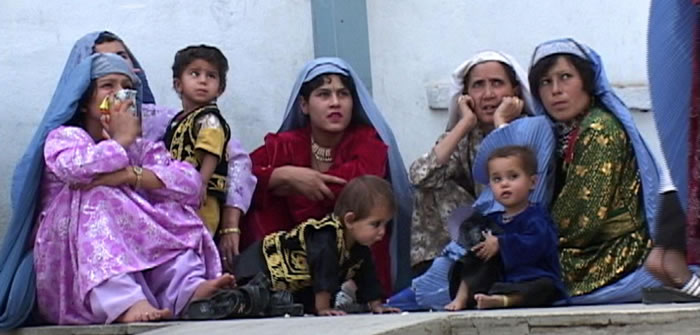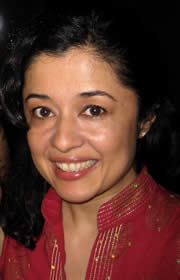 Bijan Tehrani: My first question is about your first movie Kabul, Kabul I want to know going to Afghanistan, were you really scared?
Bijan Tehrani: My first question is about your first movie Kabul, Kabul I want to know going to Afghanistan, were you really scared?
Sedika Mojadidi: Well, when I made my first film I was very inexperienced. I won’t say that I was scared really, I think I was more overwhelmed and disturbed and I think I was more depressed about the situation; You know the state of women and the state of poverty that I saw…and just the state of people’s lives and how miserable the situation was for them there. I think I was more depressed then scared.
Bijan: How well Kabul Kabul was received before September 11? I believe then Americans were then ignoring the situation in Afghanistan?
Sedika: Yes, absolutely. I finished the film in 2000 at the Art Institute of Chicago where I was getting a masters degree and it ended up being a short film. It was a very loose personal story; it wasn’t a social documentary by any means. When I sent it out to different festivals, I got was rejected from like seven or eight of them. I was sort of surprised because in those days there weren’t any films or personal documentarys or anything at all about the situation in Afghanistan and still my film didn’t get accepted anywhere. But then after September 11th, there was a huge frenzy and people were calling me and asking to show my film and honestly I was very disturbed by that. But you know, people suddenly remembered Afghanistan and Afghanistan became such a prominent news item that I guess the festivals and the different screening exhibitions needed programming so I was then able to show my film in festivals and then it was picked up by a distributor in New York. So yes, September 11th definitely changed things for me.
Bijan: We are getting back to the same situation again that Afghanistan has become the secondary interest in a way because Iraq is in the focus now…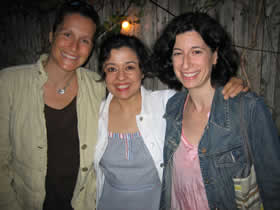
Sedika: Yes. I think in many ways the way that the news media, and the Bush Administration portrayed Afghanistan as a success story or at least that was this was the case until last year. I think now we can see that Afghanistan is growing more insecure and there are lots of articles about the problems in Afghanistan. But I do think that we are not seeing enough stories as we should about Afghanistan, about the situation there and about the U.S. presence there. We are not seeing it as prominently as the news on Iraq. There are about 20,000 U.S. troops stationed in Afghanistan. This is a huge presence there and I think this country should have a viable interest in stories about Afghanistan. But I would agree. I am not seeing enough coverage that could be called a realistic portrayal.
Bijan: What was your impression of Afghanistan the first time you went there compared with what you expected? You lived many years of your life in the US.
Sedika: True, I spent all my life except for two to three years in the United States. You know, I grew up watching the war on television and watching Afghanistan on television from a few films and I had a very romantic notion of what the place was like and I think that was very naïve. My first visit to Afghanistan was definitely a wake-up call for me particularly the areas that we traveled to, were pretty devastated. But I do have to say that I was really struck immediately by the beauty of the landscape. The landscape was very stark and desert-like but I was very struck by how raw and beautiful it was. And of course there was also the reality of people’s lives that were very different from what you see on television. Watching life in Afghanistan in a news piece or even in a documentary piece, it’s so mediated. They can never really match the experience of being there.
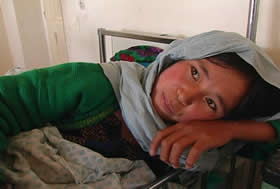 Bijan: One thing that I want to know is how did you feel as a woman about the situation of women in Afghanistan?
Bijan: One thing that I want to know is how did you feel as a woman about the situation of women in Afghanistan?
Sedika: Well you know it’s very hard as a women to go over there and it’s very hard as an Afghan-American women, which is what I am, because I’m going into a cultural situation where it’s very, very conservative. There’s been 30 years of war which has pretty much erased any kind of modernizing elements in the entire country. Religious extremism has grown to such an extent in Afghanistan that many of the values of very extreme Islam has became the norm there. So it’s very difficult to walk into a place like that because I have to be able to navigate and be able to get my work done in a place that doesn’t really recognize me as being equal to a man. As much as the rhetoric now is about Afghan women finding a voice and a place, it’s a very small percentage of the country. It’s very difficult and I try to do my best to respect their values there because I think that’s the most valuable way for me to be able to work as a filmmaker in the country. I try to honor the situation there as much as I possibly can. But I wouldn’t say that it’s easy; it definitely is a challenge.
Bijan: Motherland Afghanistan is about the people who are devoting their life to make a change in people’s life. How did you come with that subject and what 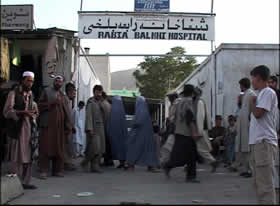 inspired you to make it?
inspired you to make it?
Sedika: Well, for me it was a story that I felt was interesting and I was hoping that I could tell the story in a different way and bring people and make them more intimate with the situation of women’s health in Afghanistan and that situation is very, very bleak. I thought that this would be something that people haven’t had a chance to see. They haven’t seen an Afghan family working over there, like my parents and myself in a different way. Maybe they start to look at Afghanistan in a different way and not as a freaky, dangerous place. I thought that would be interesting and hopefully it will be for the people that watch it. As far as inspiration, my dad inspired me. He always inspired me as a kid growing up with his commitment and his unwillingness to give up. I’ve seen him over 20 years working in Afghanistan in various capacities and I thought, “Wow! He’s really doing it!” He is a real life example of someone who isn’t perfect by any means but keeps doing something that he really, really cares about against all the challenges. The people that I’ve shown it to say, “You know I really want to go do something. It makes me really want to get up and do something.” And that makes me happy. If this film can motivate people…and it doesn’t necessarily have to motive them to go to Afghanistan but to realize that it’s really just about commitment and determination and just caring about what you do. You know, showing that here’s someone that is doing something and has been doing it for a long time and maybe I can do something too to make the world better.
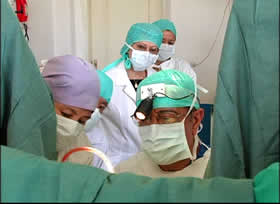 Bijan: Another strong point made in Motherland Afghanistan is to show the audience that the people on the screen are people like themselves, they aren’t coming from another planet and they aren’t lower than them. I was also amazed by the strength of the Afghan women you portrayed in your film.
Bijan: Another strong point made in Motherland Afghanistan is to show the audience that the people on the screen are people like themselves, they aren’t coming from another planet and they aren’t lower than them. I was also amazed by the strength of the Afghan women you portrayed in your film.
Sedika: I absolutely agree with you. The news media in this country has alienated people from other people in the Middle East or Afghanistan. We see images of Afghan people that dehumanize them in such a way and to such an extent that reduces them to clichés and stereotypes and I’m always troubled by that. Every film that I’ve made, Motherland Afghanistan, Kabul, Kabul and a short, Zulaikha I shot in Los Angeles, are about Afghanistan. One of my primary objectives in all of them has been to somehow humanize the people that I am filming because and I don’t want to say that it’s just to show positive images of Afghans because I think what’s more interesting is to show complicated images of Afghans. And also wanted my films to be a true representation of the subject and to let the audience connect to it; they can see Afghan people’s desires and sufferings. I think any documentary maker working on this subject needs to be aware of the fact that there are a lot of people that think Afghans are not human in a certain way…or Iraqis or Iranians.
Bijan: Could you please tell us about any of your future projects?
Sedika: I’m interested in doing a story about a young woman, and I’m not sure if she’ll be Afghan, a young woman that comes to the states for an arranged 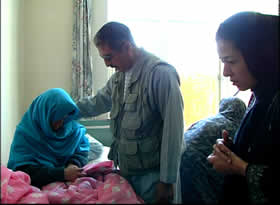 marriage and she meets her husband for the first time.
marriage and she meets her husband for the first time.
Bijan: Wow, I think that’s a very interesting story.
Sedika: You think so? I don’t know I’m very interested in that because I’ve had relatives who have married girls in Kabul who they have never met. These guys have lived in the states for forever and I also know stories about older men who have married younger girls. I’m interested in this idea and developing the story of a young girl in the states that is coming into this kind of marriage. I’d like to shoot it as a documentary where it combines documentary aesthetics and shooting techniques but the story would be fictional.
Bijan: Yes, that’s great. That’s a very, very nice idea actually. Thanks a lot.

